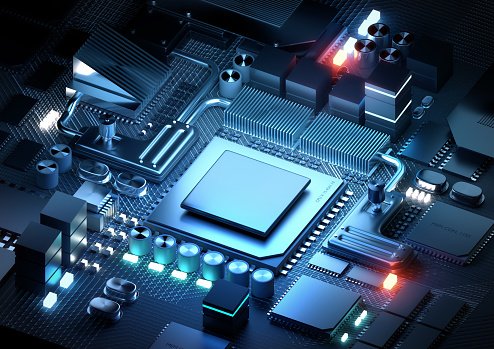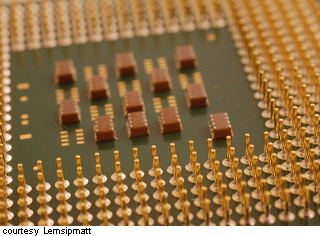The CPU is the “brain” of a computer, processing information, making decisions, running programs, and coordinating tasks within the device.
In this article, we will explain what the CPU is and how it works in simple and easy-to-understand words.
What is a CPU?

The term CPU stands for Central Processing Unit. It is the part of your computer (or any device like smartphones, tablets, or gaming consoles) that acts like the brain. Just like your brain controls everything you do, the CPU controls everything that happens inside your computer or phone.
The CPU makes decisions, performs calculations, and tells the other parts of the computer what to do. It is often called the “brain” of the computer because without it, your device wouldn’t be able to perform any tasks.
Parts of the CPU:
Even though the CPU looks like a small chip, it is made up of several important parts. These parts work together to help the CPU perform its tasks. The main parts of a CPU are:
- ALU (Arithmetic Logic Unit): This part handles all the calculations and decision-making processes. It performs tasks like adding, subtracting, and comparing numbers.
- CU (Control Unit): The control unit manages and coordinates all the activities inside the CPU. It directs the flow of data and instructions to the correct parts of the CPU and the computer.
- Registers: These are small storage areas inside the CPU that hold data that the CPU is currently working on. They are very fast and allow the CPU to access and process information quickly.
- Cache: This is a small, high-speed memory used by the CPU to store frequently used data. It helps the CPU access information faster and improve performance.
How Does the CPU Work?
The CPU performs tasks using something called the fetch-decode-execute cycle. This is a repeating process where the CPU fetches instructions, decodes them to understand what needs to be done, and then executes the instructions.
Here’s how this cycle works step by step:
- Fetching Instructions: The CPU gets instructions from the computer’s memory. These instructions tell the CPU what action to perform, like adding numbers or displaying something on the screen.
- Decoding Instructions: After the CPU fetches the instructions, it decodes them to figure out what it needs to do. The CPU’s control unit is responsible for this step.
- Executing Instructions: Once the CPU understands what to do, it performs the action. This could involve calculations, moving data, or controlling other parts of the computer.
- Storing the Result: After the instruction is executed, the CPU stores the result in memory or displays it on the screen.
This cycle happens extremely fast, millions or even billions of times per second, which is why computers and phones can perform complex tasks so quickly.
Also read: Does Nvidia L4 What Is Architiecture – Understanding The Nvidia L4 Architecture!
Why is the CPU Important?
The CPU is incredibly important because it is responsible for all the activities that happen on a computer. Without a CPU, there would be no way to process information, run programs, or even turn the device on.
Here are some of the main reasons the CPU is so important:
Speed:
The CPU determines the speed at which a device processes information. A faster CPU allows your device to run programs and perform tasks quickly. This is why modern computers and smartphones come with more powerful CPUs, enabling them to run applications with higher efficiency. The CPU’s speed directly impacts overall performance, whether you’re browsing, gaming, or running demanding software. A faster CPU ensures smoother, more responsive user experiences.
Multitasking:

A powerful CPU allows devices to handle multiple tasks simultaneously. With a good CPU, you can run several programs at once, such as listening to music, browsing the internet, and working on documents. The CPU divides its resources efficiently, ensuring smooth performance even under heavy workloads. This ability to multitask enhances productivity, making your device versatile and capable of handling various applications without noticeable lag or delays.
Efficiency:
A high-performance CPU is more efficient, completing tasks in less time and using fewer resources. This leads to smoother performance, especially in resource-heavy applications like gaming, video editing, and 3D rendering. Efficient CPUs reduce power consumption, allowing devices to run longer on a single charge, such as in smartphones and laptops. The efficiency also minimizes heat production, helping devices stay cooler and perform consistently during extended use, enhancing overall system longevity.
Running Complex Programs:
The CPU is essential for running complex software, from basic word processors to advanced video games and graphic design tools. Powerful CPUs can manage sophisticated calculations and process large datasets quickly, enabling smooth operation of demanding applications. Without a capable CPU, tasks such as 3D rendering, video editing, and running simulations would be slow or even impossible. A strong CPU ensures that devices can handle increasingly complex and high-performance software efficiently, providing users with optimal functionality.
Also read: Update Gpu Drivers – A Simple Guide For Everyone!
Types of CPUs:
There are different types of CPUs depending on the device and the job they need to do. The most common types include:
- Desktop CPUs: Desktop computers use CPUs designed for high performance. These CPUs are usually larger, more powerful, and capable of handling demanding tasks like gaming, video editing, and running large software applications.
- Laptop CPUs: Laptop CPUs are designed to balance performance and power efficiency. They need to provide good speed but also consume less power to help save battery life.
- Mobile CPUs: Mobile devices like smartphones and tablets have CPUs that are designed to be very power-efficient. These CPUs are smaller, consume less power, and focus on providing good performance while maintaining battery life.
- Server CPUs: Servers, which are computers used to manage large amounts of data or support websites, use specialized CPUs designed for heavy-duty work. These CPUs are built to handle lots of data at once and ensure that websites or services run smoothly.
What Affects CPU Performance?
The performance of a CPU is influenced by several factors. Here are the key elements that can make a CPU faster or slower:
- Clock Speed: Clock speed, measured in GHz, determines how fast a CPU processes instructions. Higher clock speeds mean quicker performance, though it’s not the only factor—multi-core performance also matters.
- Core Count: More cores enable better multitasking, allowing a CPU to handle multiple tasks simultaneously. More cores improve performance in demanding applications and multitasking.
- Cache Size: Larger caches store more data for quick access, improving performance in tasks like gaming or video editing.
- Thermal Design Power (TDP): TDP indicates the heat a CPU generates. Higher TDP requires better cooling to maintain optimal performance and prevent overheating.
- Instruction Set Architecture (ISA): ISA defines the types of instructions a CPU can execute. Different ISAs, like x86 (for PCs) and ARM (for mobiles), affect performance based on task optimization.
FAQ’S
1. What does the CPU do in a computer?
The CPU processes data, makes decisions, and runs programs. It acts as the “brain” of the computer, controlling and coordinating all its operations.
2. Can a computer work without a CPU?
No, a CPU is essential for a computer to function. It processes instructions and manages all tasks, without which the device wouldn’t be able to operate.
3. Why is a CPU important for performance?
The CPU directly affects the speed, multitasking ability, and efficiency of a device. A faster CPU allows the device to perform tasks more quickly and effectively.
4. What are the different types of CPUs?
CPUs come in different types: desktop CPUs for high performance, laptop CPUs for balanced power, mobile CPUs for efficiency, and server CPUs for heavy-duty tasks.
5. How does clock speed affect CPU performance?
Clock speed, measured in GHz, determines how many instructions a CPU can process per second. Higher clock speeds result in faster performance, but other factors also matter.
Conclusion
The CPU is the heart of a device, handling data processing, running programs, and ensuring smooth performance. Its speed, core count, efficiency, and multitasking abilities are key factors that impact how well a device functions. Whether in desktops, laptops, or mobile devices, a powerful CPU is essential for delivering optimal performance and an excellent user experience.



